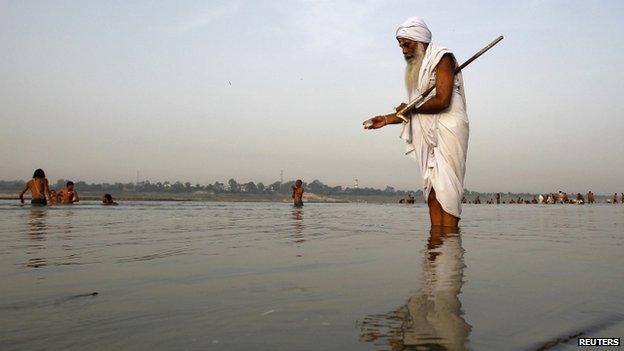Indian media: Cleaning up Ganges
- Published

The Ganges supports a third of India's 1.2 billion people living on its floodplains
Media in India are highlighting the Supreme Court's concerns over the government's "bureaucratic plan" to clean up the Ganges river.
The court on Wednesday directed the government to submit a concrete stage-wise strategy within three weeks for the rejuvenation of the heavily-polluted river, reports said.
Locally called the Ganga, the Ganges is revered by Hindus. It is India's longest river and supports a third of the country's 1.2 billion people living on its floodplains.
Prime Minister Narendra Modi had promised to clean up the Ganges during his election campaign speeches earlier this year and his Bharatiya Janata Party government has set an "ambitious" target to complete the task within three years.
Leading dailies have given prominent coverage to the court's displeasure with the government's plans.
"SC [Supreme Court] pulls up government on Ganga clean-up plan," the Deccan Herald, external says in a front-page headline.
"Your plan will take 200 years to clean Ganga: SC to Centre," reads The Tribune's, external headline.
Papers say the court is "unhappy" and "dissatisfied" with the government's "bureaucratic plan" and wants the authorities to expedite the process.
"After seeing your action plan, it seems Ganga will not be cleaned even after 200 years. Evaluate the dream project. You have to take steps to restore Ganga to its pristine glory," the Hindustan Times, external quotes the court as saying.
"Please try that the next generation is able to see the river in its original form… We don't know whether we will see it or not," the court added while evaluating the government's report.
Over 200bn rupees (£2bn; $3.3bn) have been spent on cleaning the Ganges since 1985, the Hindustan Times says.
Hindi paper Amar Ujala, external says the government of Mr Modi, who has just returned "after securing a promise" from Japan to help clean up the river, has had to face a "strict admonishment" from the court.
The Hindu, external says the court wants to monitor the Ganges restoration project because it is "sceptical" about the government's "assurances".
Power shortage
And finally, the media are also expressing concern over a "looming power crisis" in the country due to a major shortage of coal supplies.
According to official figures, the number of thermal power plants having less than seven days of coal stocks has increased to 56 from 52 last week, the India Today, external website reports.
Over two-thirds of India's power supply comes from coal-based thermal plants.
The coal stocks are the lowest since the power crisis in 2012 when the northern electricity grid had collapsed, leaving millions without power for several hours, it adds.
Officials say the situation becomes worse during the monsoon season as coal extraction from mines slows down.
Meanwhile, the Hindustan Times, external says hydropower generation has also been affected by low rainfall.
This shortage has in turn put a "greater burden" on power generation by thermal plants, it adds.
BBC Monitoring, external reports and analyses news from TV, radio, web and print media around the world. For more reports from BBC Monitoring, click here. You can follow BBC Monitoring on Twitter, external and Facebook, external.